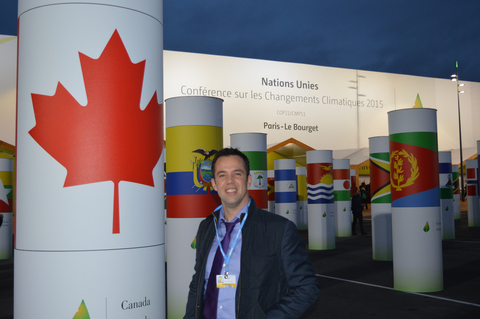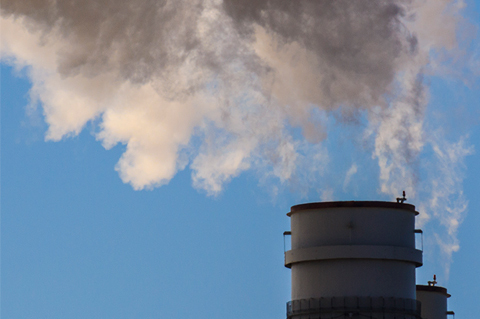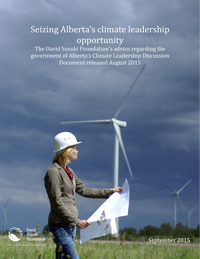David Suzuki's Blog, page 49
December 1, 2015
Inside look at the UN climate conference

Got questions or comments for DSF climate experts Ian Bruce and Steve Kux? Email climateaction@davidsuzuki.org or tweet
A UN conference is a surreal experience.
I've been lucky to be among leaders from around the world for the last few days, representing DSF along with Science and Policy Director Ian Bruce.
This climate conference is the 21st meeting of its kind. Its goals: to develop an effective global response to climate change with strategies beyond the year 2020; and to establish a means to financially assist developing nations as they face greater vulnerability to climate change.
Yes -- I want bold action from Canada at the climate talks!
As accredited observers, Ian and I have access to the conference's restricted "Blue Zone" where negotiations are taking place. Civil society groups and businesses are hosting events open to the public in the "Green" and "Red" zones, respectively.
The atmosphere is electric. The summit is being held at the Paris-Le Bourget airfield, where Charles Lindbergh landed the Spirit of St. Louis after completing the first successful trans-Atlantic flight. One hundred thousand people welcomed Lindbergh, eager to usher in a new era in aviation. There are 40,000 of us in Paris now -- most similarly eager for a new era in global co-operation and sustainability.
Day one of the conference was a whirlwind of once-in-a-lifetime experiences. After making our way through strict security checks, we met with the Canadian Climate Action Network for a briefing on the day's events. Over the next several hours we rushed around the vast site, attending meetings with experts; a lunch event hosted by the premiers of Ontario, Alberta and B.C.; and a news conference with Prime Minister Justin Trudeau and five provincial leaders before finally (and somewhat frantically) jumping into a room with the CAN team to hear the prime minister's summit address.
In between, we chatted with Green Party Leader Elizabeth May, NDP Leader Tom Mulcair, new Liberal Minister of the Environment and Climate Change Catherine McKenna, and Ontario Minister of the Environment and Climate Change Glenn Murray. All agreed that now is the time for Canada to take a leadership role in the fight against climate change. Justin Trudeau's declaration "Canada is back!" was met with thunderous applause.
Yes -- I want bold action from Canada at the climate talks!
Canada has a historic opportunity to step up by reducing emissions and speeding the transition to a clean economy. Cities and provinces have been leading the way for close to a decade, crafting innovative policies that have cut emissions while strengthening regional economies. It's time for our federal government to turn this momentum into a national strategy we can proudly present to the world. Young Canadians and future generations will have to live with the outcomes of the choices we make today.
In his speech, the prime minister committed to creating a climate action plan with more ambitious targets for driving down emissions and concrete strategies for meeting those targets -- but the plan won't come for 90 days while the new government meets again with provincial and indigenous leaders.
Canadians are clearly on board. Over 25,000 united on Parliament Hill November 29 for the 100% Possible march to demand climate action, joined by hundreds of thousands in cities across the country and around the world. Thank you and congratulations to each and every one of you who participated, from everyone at the DSF -- this powerful movement was on all our minds at the climate summit launch.
COP21 may not be the first or the last UN conference on climate change. But it's shaping up to be one of the most pivotal. Political will and public support are streaming together, which could lead to some real results.
This is just the beginning.
Hey! Want more DSF? Join David Suzuki on Facebook
November 30, 2015
How to give the gift of time

Instead of "presents" I demand "presence" from my friends and family.
I don't want presents from my friends and family. Shopping and buying stuff is the easy way out.
I want much more.
I want to appear as a line item in my loved ones' calendars, take them away from screens and enjoy their presence over a coffee or lunch, or an experience like a light festival or ice skating.
Life is about relationships -- I want to invest in, deepen and nurture those. I want my friends and family to consider giving me something they can never get back (that I also won't have to dust, regift or recycle) -- their precious time.
How I launched "presence" instead of "presents"
The first step was having a courageous conversation -- with myself. What was my real intent? I didn't want to make people feel bad or guilty.
So I first told the people in my life who would have the hardest time giving up giving things that I'd rather spend time with them.
It was awkward at first. Now my family and friends are used to my way of expressing generosity. (I don't get stuff!)
Still determined to give material gifts?
Give homemade items (also an indicator of time spent)
Make a donation
Regift
Practice true generosity -- a gift freely given doesn't require acknowledgment or even a thank you!
What advice would you give to someone who wants to try a no-material-gift policy for the first time in order to lower consumption and nurture relationships this holiday season?
Sincerely,
Lindsay Coulter, a fellow Queen of Green
Hey! Want more DSF? Join David Suzuki on Facebook
David Suzuki Foundation is encouraged by Canada's five-point climate action framework
VANCOUVER -- Today at the United Nations climate summit, Prime Minister Justin Trudeau outlined a five-pillared framework for developing a national climate action strategy and stressed the importance of building on solutions from provincial, municipal and indigenous leaders.
"Co-operation is what moves the needle on major issues like climate change," said Ian Bruce, director of science and policy for the David Suzuki Foundation. "Canada's federal government has a historic opportunity to show global leadership by recognizing the best provincial policies already in place and by strengthening and amplifying those solutions at a national scale."
The five ideas at the heart of the federal government's approach: a commitment to science-based decision-making; policies to develop a low-carbon economy including a national price on carbon pollution; a collaborative approach with municipal, provincial and indigenous leaders; assisting the developing world through financing for climate adaptation and mitigation projects; and viewing climate change as an opportunity to build a more innovative, clean economy.
The David Suzuki Foundation is encouraged by commitments made today by the prime minister. Given the pledge to develop both targets and a plan for action within 90 days of the UN climate summit, there is reason for optimism. The commitment to science-based decision-making and a collaborative approach that includes indigenous leaders represents a positive shift in Canadian climate policy. DSF will be looking for details in the plan that include ambitious targets, a national price on carbon pollution and a promise to speed up the transition to renewable energy.
The prime minister's address comes following several weeks of announcements from governments across Canada to speed the transition to a clean energy economy.
Last week the federal government announced a five-year plan to contribute $2.65 billion to the United Nations Green Climate Fund for developing countries, but has yet to declare what its contributions will be post-2020, when developed nations have committed to contribute a total of $100 billion annually.
"The recent federal and provincial commitments have been substantial, but are not a complete response for the country," said Bruce. "In order to seize the opportunity that the global climate summit represents, Canada needs to be clear about where it is going and how long it will take.
By acting as a country we can do much more to meet Canada's commitments. That is the real strength of a federal, unifying climate strategy."
30
For more information or commentary contact:
In Paris:
Steve Kux
David Suzuki Foundation
00-1-604-374-5095
skux@davidsuzuki.org
In Vancouver:
Theresa Beer
David Suzuki Foundation
778-847-3396
tbeer@davidsuzuki.org
In Montreal:
Manon Dubois
David Suzuki Foundation
514-679-0821
mdubois@davidsuzuki.org
Hey! Want more DSF? Join David Suzuki on Facebook
November 27, 2015
Without strong commitment at UN climate talks, B.C. won't regain leadership status
For immediate release -- Friday, November 27, 2015
**VANCOUVER -- **Three days before the United Nations climate conference begins in Paris, France, British Columbia has yet to announce climate commitments. This is disappointing as other provinces are taking new, credible plans and policies to address climate change to the UN climate talks. B.C. risks not regaining its status as an innovative leader in an area it originally championed.
Today, the B.C. Climate Leadership Team released recommendations it says are needed for British Columbia to step up strongly at the Paris conference.
The Climate Leadership Team was appointed by the B.C. government in May to provide expert advice and recommendations for the province's climate action plan. It includes representatives from environmental groups, government, First Nations, the business sector, academia and other sectors. The David Suzuki Foundation helped develop B.C.'s groundbreaking climate polices in 2008, and submitted material for the current team's consideration.
Although B.C.'s adoption of a carbon tax incentive in 2008 has received praise, the B.C. government froze tax levels in 2012. The Climate Leadership Team recommends an annual $10 increase in the tax starting in 2018 and expansion to include all emissions.
Other highlights include energy-efficiency recommendations for buildings, more financing for energy retrofits, a task force to investigate B.C.'s competitive advantages in a low-carbon economy and moving toward zero-emissions standards for vehicles. The leadership team also looked at B.C.'s plans to expand liquefied natural gas development and recommends that BC Hydro develop a strategy to supply LNG, natural gas and associated infrastructure projects with clean power.
The team acknowledges that more work is needed to develop requirements to reduce emissions in the transportation sector and to build public-transit infrastructure. Even with the team's strong recommendations, B.C. will have to take further action to meet its 2020 emissions target, the team concludes.
"With support for action on climate change coalescing at all levels in Canada -- on the streets, among businesses, in cities and at the provincial level -- B.C.'s lack of a strong climate commitment so far seems out of step," said David Suzuki Foundation science and policy director Ian Bruce. "We hope the B.C. government will make an announcement at the UN climate conference, but it's disappointing that a province that once led on climate solutions is in danger of losing its status as world leaders gather for the climate summit. Adopting the leadership team's recommendations would be a good start, with more work needed before 2020 targets can be met."
The David Suzuki Foundation is sending a three-member team to the UN climate talks in Paris. For more information, see: www.davidsuzuki.org/media/news/2015/11/david-suzuki-foundation-delegation-available-for-media-interviews-at-un-climate-/
-- END --
For information, please contact:
Kyle Aben, Climate Change and Clean Energy Policy Analyst, David Suzuki Foundation: 778-984-6998
Hey! Want more DSF? Join David Suzuki on Facebook
David Suzuki Foundation delegation available for media interviews at UN climate summit in Paris
VANCOUVER - Members of the David Suzuki Foundation's climate team are available for interviews at the United Nations climate summit in Paris, taking place between November 30 and December 12. These talks represent the beginning of a new phase in global climate action, with political, business, religious and civil society groups working together for global action to accelerate the transition to renewable energy and eliminate carbon pollution.
The delegation will be led by Science and Policy Manager Ian Bruce, a former geophysicist with the oil and gas industry with 12 years of renewable energy advocacy and climate change policy experience. Bruce will be featured during the Canadian segment of Al Gore's 24 Hours of Climate Reality broadcast on November 13 and will be available for interviews in Paris along with Climate and Clean Energy Communications and Research Specialist Steve Kux. Spokespeople at the Foundation's Vancouver, Toronto and Montreal offices can offer media perspectives on climate announcements from Paris as they affect Canadians at home.
"With climate leadership already underway at municipal and provincial levels, we are optimistic that Canada's federal government can seize the opportunity that Paris presents, with support from Canadians, to coordinate an effective and responsible national strategy to cut carbon pollution and build a strong economy for Canada based on renewable energy and clean technology," Bruce said.
Delegate contact information:
Ian Bruce
Science and Policy Manager
604-306-5095
ibruce@davidsuzuki.org
In Paris: November 29 to December 12
Steve Kux
Climate and Clean Energy Communications and Research Specialist
604-374-4102
skux@davidsuzuki.org
In Paris: November 29 to December 12
For domestic inquiries in Canada during the summit:
Theresa Beer (Vancouver)
Communications Specialist
778-847-3396
beer@davidsuzuki.org
Manon Dubois (Montréal)
Directrice des communications, Québec
514-679-0821
mdubois@davidsuzuki.org
Hey! Want more DSF? Join David Suzuki on Facebook
November 26, 2015
Canada's oceans matter, at the Paris climate talks and beyond

Many shellfish are extremely vulnerable to ocean acidification and some areas most at risk are also least prepared to respond and adapt to the crisis. (Credit: Alicia Wellman via Flickr)
It's encouraging that our newly elected federal government has agreed to improve efforts to safeguard Canada's oceans. Ocean protection here is shamefully deficient, currently at around one per cent. The new government has restated our country's commitment to protect 10 per cent of our oceans by 2020, as part of a global agreement Canada signed in 2010 at the 10th meeting of the Convention on Biological Diversity.
Increased ocean protection was one change called for in a recent peer-reviewed paper written by 19 scientists from across the country (including my daughter, Sarika). "Canada at a Crossroads: The imperative for realigning ocean policy with ocean science" offers recommendations for government to step up its game when it comes to ocean health.
The report highlights recent federal conduct that has increased the vulnerability of our coasts, including changes to the Fisheries Act (most notably, decreasing habitat protection), disregard for the Oceans Act (an important framework that emerged in the late 1990s outlining ocean management and protection) and inaction on species at risk.
Weak ocean protection hinders our coasts' ability to remain resilient in the face of many challenges. A recent report in Science estimated that globally in 2010, five to 13 million tonnes of plastics ended up in the oceans. Plastics often break down into tiny, toxic pieces, which are turning up in the stomachs of many marine birds, fish and turtles.
Agricultural runoff, untreated sewage and coastal development have added to the ocean sludge and created hundreds of wastelands devoid of oxygen, or "dead zones", which can change fishes' sex organs and leave animals gasping for air.
Over the past two years we were also hit by the "the blob", a large patch of water in the Pacific Northwest that is 3 C warmer than average. It's a product of unseasonably hot, dry weather and is the highest water temperature ever recorded in this area. When I heard triggerfish were showing up in the North Pacific, I was shocked. They're tropical fish! The blob brings some warm-water hitchhikers.
Carbon dioxide is perhaps the most dangerous human waste found in our oceans. CO2 from the atmosphere is absorbed at the water's surface, where it reacts with seawater and turns into carbonic acid before breaking down further into acid and bicarbonate ions. We know changing the pH of seawater is dangerous for marine life.
On the West Coast we've recently seen scallops struggling to make shells, a chilling portent of what might come as oceans become more acidic. A study published earlier this year in Nature Climate Change found that many shellfish are extremely vulnerable to ocean acidification and that some areas most at risk are also least prepared to respond and adapt to the crisis.
Still, there are signs that Canada is ready to take ocean health seriously. "Canada at a Crossroads" ends by offering a constructive to-do list to help this country get back on track, and our newly elected government has made a number of commitments that align with its recommendations. They include reassessing the recent Fisheries Act amendments, reversing funding cuts to Fisheries and Oceans Canada, increasing marine and coastal protected areas and allowing government scientists to speak freely about their work. The government has also moved to formalize the moratorium on crude oil tankers on B.C.'s North Coast, which will help ensure coastal biodiversity is protected from spills.
The government should also ensure that oceans are an integral part of the upcoming UN climate summit in Paris November 30 to December 12. Because they absorb carbon dioxide, oceans are critical in the fight against climate change, and they are vulnerable to its effects. I hope Canada plays a constructive role in Paris and at home to ensure that oceans and all the life they support are protected and cared for.
It's refreshing to see studies with constructive recommendations for these serious issues, and to see the federal government respond positively. Let's hope we've entered a new era in maintaining and enhancing the health of our oceans.
Oceans supply half our oxygen, absorb a quarter of our emissions, produce food, regulate climate and weather, give us medicine, culture, renewable energy and jobs, and support a diversity of life. We can't live without them.
Hey! Want more DSF? Join David Suzuki on Facebook
November 25, 2015
The end of coal in Canada?

(Credit: machinecodeblue via Flickr)
By Gideon Forman, Climate Change and Transportation Policy Analyst
In 2010, in an inspiring piece in the New York Times Magazine, "Building a Green Economy", Nobel-winning economist Paul Krugman wrote, "whatever else we do, we have to shut down coal burning over the next couple decades." Who would have predicted that just five years later Canada would be on its way to meeting his ambitious target?
This week, the province of Alberta pledged to phase out its fleet of coal-fired electricity plants by 2030, taking just 15 years to rid itself of a fuel currently supplying over half its power. (The province deserves special kudos because federal regulations don't require the last coal facility to close until 2062!) Alberta promises to replace two-thirds of the coal with renewable energy, especially wind -- an extraordinary decision by the jurisdiction that currently burns more coal than the rest of Canada combined.
The importance of abandoning coal can't be overstated. In addition to being the most carbon-intensive fuel, coal releases brain poisons such as mercury and carcinogens such as arsenic. It also contributes to acid rain by emitting sulphur dioxide. Going coal-free means protecting Canada's climate, our lakes and our health.
Alberta's announcement is the latest in a string of good news stories about the black rock's demise. Ontario's Ending Coal for Cleaner Air Act passed third reading this week; when implemented, it will build on the 2014 closure of the province's last coal plant, prohibiting the use of this fuel not just by the current government but any future one. Last week, Saskatchewan said it would source 50 per cent of its power from renewables by 2030. Manitoba is virtually coal-free already, using the fuel primarily for emergencies.
New Brunswick has only one coal-fired station that provides just 11 per cent of its electricity. Nova Scotia still relies heavily on fossil fuel, but its energy trajectory is encouraging, projected to drop from a depressing 92 per cent of power from fossil fuels in 2001 to 60 per cent (including coal) in 2020, with the remaining 40 per cent coming from renewables -- not as impressive as we'd like, but a dramatic improvement. And if these jurisdictions enact a carbon price, which seems likely given federal government priorities, we could see the Maritime grid's coal use drop even further.
Are the days of coal-fired power in Canada coming to an end? It seems that way. If so, the new policy will be part of a heartening international trend that includes the American Clean Power Plan and Britain's just-announced 10-year coal phase-out. These strategies are not perfect -- the problematic use of natural gas and nuclear power will continue -- but there will be less combustion of the toxic black rock. For that we should be immensely grateful.
Paul Krugman may be surprised -- and delighted -- that the warning he issued in 2010 is on its way to being achieved, at least in the U.K. and North America.
Hey! Want more DSF? Join David Suzuki on Facebook
Buy-Low foods is the first major grocer in North America to achieve sustainable seafood commitment
In less than two years since publicly announcing its sustainable seafood policy with SeaChoice, Buy-Low Foods has become the first North American major grocer to remove all fresh and frozen red-listed "Avoid" seafood and replace these products with seafood from more sustainable sources at its corporately owned locations, including Nesters Market.
Buy-Low Foods implemented an aggressive work plan to successfully replace red-listed "Avoid" seafood with more ocean-friendly choices, discontinuing the sale of many high-demand species such as open net-pen farmed salmon, Atlantic cod and Russian king crab.
"Buy-Low Foods has worked extremely hard to find innovative solutions to many challenging seafood issues, including farmed salmon and shrimp, in an effort to meet the goals of their robust sustainable seafood policy," said Bill Wareham, SeaChoice member from the David Suzuki Foundation.
Buy-Low Foods president Dan Bregg stated, "We are proud to be the first retailer to achieve our sustainable seafood commitment to remove all red-listed items from our stores. With our dual focus on sourcing more responsible alternatives, we continue to have a great selection of choices that customers can feel good about feeding their families. Our stores will continue to work with SeaChoice to find new ways to support healthier oceans for today and tomorrow."
Buy-Low Foods
Buy-Low Foods (BLF), part of the Jim Pattison Group of companies, was originally founded as a single store in 1966 and today is a Western Canadian owned and operated retailer with 37 corporate and franchise independent stores in urban, suburban and rural communities throughout British Columbia and Alberta, with over 1,600 retail employees committed to providing their customers with quality products - BLF's neighbourhood stores have strong roots in their communities.
SeaChoice
SeaChoice, Canada's most comprehensive sustainable seafood program is about solutions for healthy oceans. Launched in 2006, SeaChoice was created to help Canadian businesses and shoppers take an active role in supporting sustainable fisheries and aquaculture at all levels of the seafood supply chain. Based on scientific research, SeaChoice has created easy-to-use tools that help you make the best seafood choices. www.SeaChoice.org.
For more information:
Lana Brandt, National SeaChoice Manager
778.833.2954
Buy-Low Foods - Media Enquiries
mediacontact@buy-low.com
Hey! Want more DSF? Join David Suzuki on Facebook
Buy-Low Foods is the First Major Grocer in North America to Achieve Sustainable Seafood Commitment
In less than two years since publically announcing their sustainable seafood policy with SeaChoice, Buy-Low Foods has become the first North American major grocer to remove all fresh and frozen red-listed "Avoid" seafood and replace these products with seafood from more sustainable sources at its corporately-owned locations including Nesters Market.
Buy-Low Foods implemented an aggressive work plan to successfully replace red-listed "Avoid" seafood with more ocean-friendly choices, discontinuing the sale of many high demand species such as open net-pen farmed salmon, Atlantic cod and Russian king crab.
"Buy-Low Foods has worked extremely hard to find innovative solutions to many challenging seafood issues, including farmed salmon and shrimp, in an effort to meet the goals of their robust sustainable seafood policy," said Bill Wareham, SeaChoice member from the David Suzuki Foundation.
Buy-Low Foods President, Dan Bregg stated, "We are proud to be the first retailer to achieve our sustainable seafood commitment to remove all red-listed items from our stores. With our dual-focus on sourcing more responsible alternatives, we continue to have a great selection of choices that customers can feel good about feeding their families. Our stores will continue to work with SeaChoice to find new ways to support healthier oceans for today and tomorrow."
Buy-Low Foods
Buy-Low Foods (BLF), part of the Jim Pattison Group of companies, was originally founded as a single store in 1966 and today is a Western Canadian owned and operated retailer with 37 corporate and franchise independent stores in urban, suburban and rural communities throughout British Columbia and Alberta, with over 1,600 retail employees committed to providing their customers with quality products - BLF's neighbourhood stores have strong roots in their communities.
SeaChoice
SeaChoice, Canada's most comprehensive sustainable seafood program is about solutions for healthy oceans. Launched in 2006, SeaChoice was created to help Canadian businesses and shoppers take an active role in supporting sustainable fisheries and aquaculture at all levels of the seafood supply chain. Based on scientific research, SeaChoice has created easy-to-use tools that help you make the best seafood choices. www.SeaChoice.org.
For more information:
Lana Brandt, National SeaChoice Manager
778.833.2954
Buy-Low Foods - Media Enquiries
mediacontact@buy-low.com
Hey! Want more DSF? Join David Suzuki on Facebook
November 24, 2015
Addressing climate change in Alberta

Alberta has the opportunity to be a true leader in the fight against climate change while maintaining a vibrant and strong economy. We encourage the Alberta government to adopt strong policies to address the challenges posed by climate change. An economy-wide carbon tax signal will address all emissions within Alberta fairly and consistently. Phasing out harmful coal power emissions will bring tremendous health benefits to Albertans but will also be one of the greatest single carbon reduction mandates in Canada. Prioritizing renewable energy development will ensure we are not exchanging one fossil fuel for another and are thinking long-term about our climate responsibilities. Both industrial producers and small consumers should be able to participate. Energy efficiency will mean the energy created is used as wisely as possible and may postpone additional generation in the province. Planning to reduce emissions from transportation will also be critical in the long term as this will demand land-use planning and a shift to active living. These Alberta- specific policies will enable the province to become a leader in addressing climate change while maintaining a vibrant economy and improved quality of life.
Considering the upcoming United Nations climate negotiations in Paris, future generations may very well look back on 2015 as the year that the world co-operated and acted together in the fight against climate change. We encourage the Alberta government to lead the shift to an innovative, clean-energy global economy.
Hey! Want more DSF? Join David Suzuki on Facebook
David Suzuki's Blog
- David Suzuki's profile
- 247 followers



